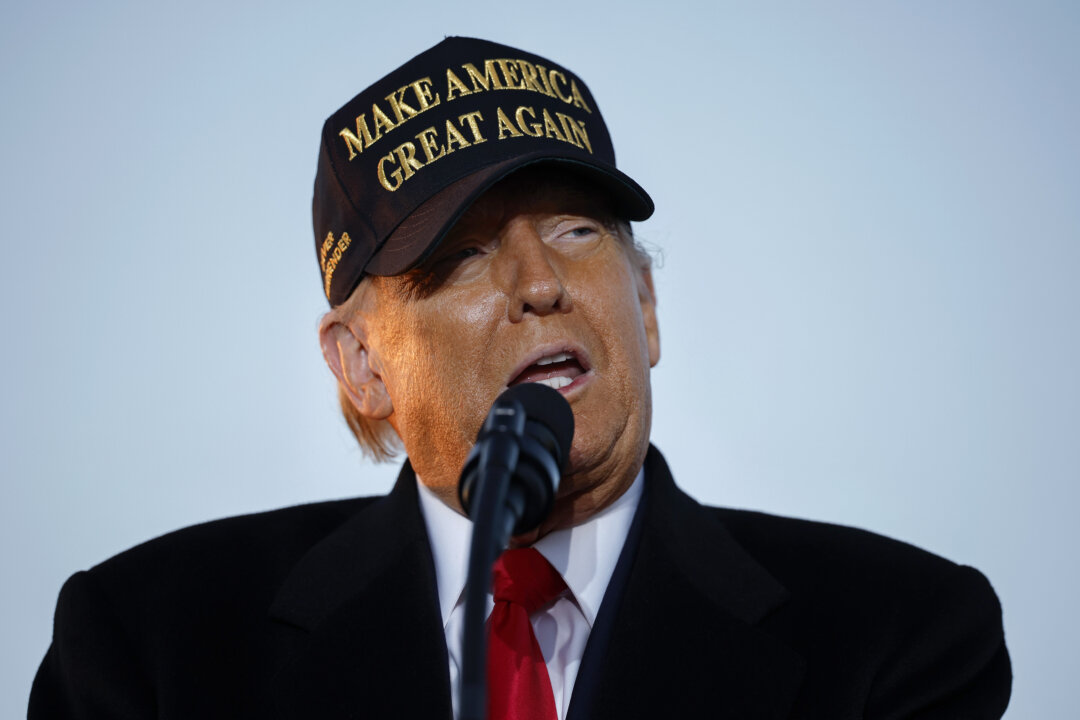‘If it doesn’t work, I’ll make it a 50 percent tariff. And if that doesn’t work, I’ll make it 75 percent,’ the Republican presidential candidate said.
Former President Donald Trump said that if he gets a second term in the White House, he would impose a new 25 percent tariff on Mexico if it does not stem the flood of illegal immigrants into the United States.
“One of the first calls I’m going to make is to Mexico: ‘You stop letting people come in through our border,’” Trump told a rally on Monday in Raleigh, North Carolina.
After noting that Mexico recently elected a new president, Claudia Sheinbaum, Trump said that he would “inform her on Day 1 or sooner that if they don’t stop this onslaught of criminals and drugs coming into our country, I’m going to immediately impose a 25 percent tariff on everything they send into the United States of America.”
While Trump has floated imposing tariffs as part of his economic agenda, his remark at the North Carolina rally appears to be the first time he’s said he wants to impose a 25 percent duty on Mexico over illegal immigration.
The Republican presidential nominee said on Monday that he believes the policy will be successful in pressuring the Mexican government to act.
“You’re the first ones I’ve told that to,” he told the crowd, referring to his proposal. “Congratulations, North Carolina. And it’s only got a 100 percent chance of working because if it doesn’t work, I’ll make it a 50 percent tariff. And if that doesn’t work, I’ll make it 75 percent.”
Going a step further, Trump said he would even impose a 100 percent tariff if necessary.
During the 2024 election cycle, the former president has often floated the idea of putting tariffs on other countries—including China and the European Union—in what he said is an attempt to have American companies move their manufacturing back to the United States. Trump has vowed to impose a 10 percent tariff on imports from all countries and 60 percent duties on imports from China.
During a rally in Michigan on Nov. 1, Trump warned that he would impose a 100 percent tariff on auto manufacturer Stellantis, which owns Chrysler, if it moves jobs from the United States to Mexico.
“Tell Stellantis that if they plan on moving, we’re going to charge them a 100 percent tariff on every car … and they won’t move,” the former president said.
Late last month, Trump told a rally in Pennsylvania that he again wants to impose duties on European countries.
“I’ll tell you what, the European Union sounds so nice, so lovely, right? All the nice European little countries that get together,” he said on Oct. 29. “They don’t take our cars. They don’t take our farm products. They sell millions and millions of cars in the United States. No, no, no, they are going to have to pay a big price.”
Some retail and business groups have said they are against the tariff policies floated by Trump.
The National Retail Federation (NRF)—which represents Walmart and other companies that account for almost half of container shipping volume—is among the industry groups opposed to Trump’s proposed tariffs.
“Tariffs are a tax on imports, operating like a sales tax wearing a mediocre disguise,” NRF said in a statement in September, adding that they may drive up the cost of goods for consumers and could harm workers and some businesses.
Trump’s opponent, Vice President Kamala Harris, has said that Trump’s tariff proposals would be, in effect, an additional “sales tax on the American people.” Speaking to MSNBC in September, she said, “You don’t just throw around the idea of just tariffs across the board, and that’s part of the problem” with Trump’s proposals.
Conservative-leaning think tank The Heritage Foundation said in an article earlier this year that Trump has been successful in the past at using the threat of tariffs to “suppress European efforts to push carbon and digital-services taxes aimed at U.S. industries.”
Strategically used tariffs can also “help break up foreign cabals and create a level global economic playing field, creating good jobs here at home,” the organization said.
Reuters contributed to this report.

